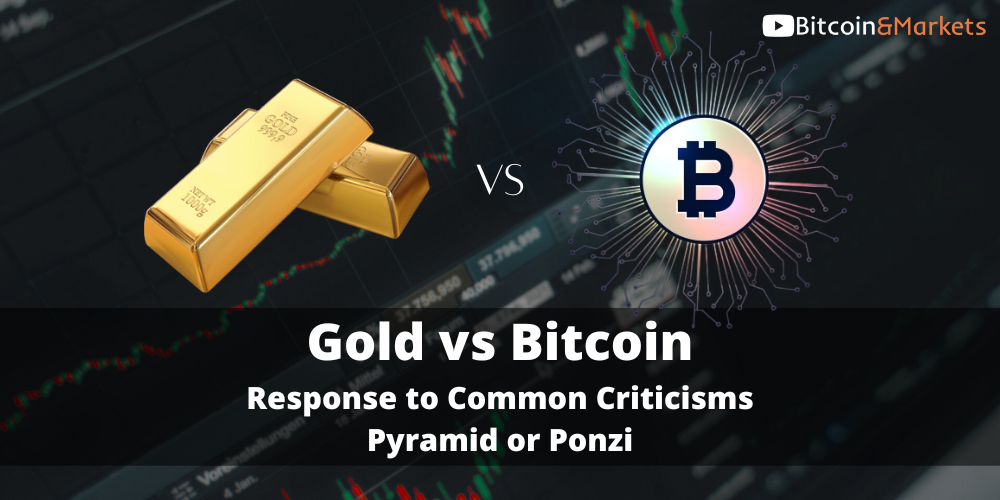Gold vs Bitcoin: Responses to Common Criticisms - Pyramid or Ponzi

Pyramid scheme
According to Investor.gov:
In the classic "pyramid" scheme, participants attempt to make money solely by recruiting new participants, usually where:
- The promoter promises a high return in a short period of time;
- No genuine product or service is actually sold; and
- The primary emphasis is on recruiting new participants.
Bitcoin does not fit this definition in any respect. While value can be accrued by recruiting new participants, the return for any individual does not depend on them personally bringing anyone in.
As to the three bullet points: 1) "Short period of time" is directly against the ethos in bitcoin of extending your time preference; 2) "No genuine product sold" is false, bitcoin is a fixed supply asset trivial for anyone on the planet to verify and can be transacted on a global decentralized network; 3) "Primary emphasis is recruiting" is correct to a degree, due to the prevalence of the hyperbitcoinization meme. However, to this latter point, hyperbitcoinization is not the clear "primary" emphasis. There is emphasis on that, yes, but other equally important aspects to any evangelism are self-improvement, freedom, etc.
Bitcoin is definitely not a pyramid scheme.
Ponzi scheme
Again, according to Investor.gov:
A Ponzi scheme is an investment fraud that pays existing investors with funds collected from new investors. Ponzi scheme organizers often promise to invest your money and generate high returns with little or no risk. But in many Ponzi schemes, the fraudsters do not invest the money. Instead, they use it to pay those who invested earlier and may keep some for themselves.
With little or no legitimate earnings, Ponzi schemes require a constant flow of new money to survive. When it becomes hard to recruit new investors, or when large numbers of existing investors cash out, these schemes tend to collapse.
Ponzi schemes are named after Charles Ponzi, who duped investors in the 1920s with a postage stamp speculation scheme.
Bitcoin has no Charles Ponzi. Indeed, Satoshi made clear in the first few sentences of the white paper the weakness of models based on trust and trusted third-parties. The decentralization of bitcoin stands in direct opposition to the structure of a Ponzi scheme.
Bitcoin is a real asset, there is no third-party committing a fraud, it does not "pay" investors returns, and the high volatility is not hidden. I cannot deny the existance of some superficial similarities between a Ponzi scheme and Bitcoin, just like those that exist with almost every asset. The similarities are confusing enough, I believe the differences deserve a little more explanation below.
Subjective Value Accrual
It is cliché at this point, but I have to repeat it here, all value is subjective, meaning value exists in the minds of men and is not an objective fact in reality. This is important because a Ponzi scheme depends on a direct 1:1 value transfer, from new investors to earlier investors. There is no "value accrual", it is all 1:1 transfers.
Bitcoin, on the other hand, has a market derived price. It is true that each exchange has two sides, a buyer and a seller, where the price is set by the last direct transfer. But unlike a Ponzi scheme, the value of bitcoin does not depend on this market price. Let me explain a little further.
As a holder of bitcoin, if I assign a subjective value to my bitcoin that is higher than the market price, it does not benefit me to exchange the bitcoin for goods and services or money, at a purchasing power lower than my subjective value of the bitcoin. As long as the purchasing power of bitcoin is below the individual's subjective value of that bitcoin, their subjective preferences lead to holding the bitcoin instead of exchanging it.
This is the argument, by the way, you can use to combat the pressure some people put on you as a holder to spend your bitcoin prematurely. You simply have to say, "It's not me who refuses to spend, it is the sellers who refuse to lower their prices enough."
A Ponzi scheme has nothing to do with subjective value accrual. It is strictly a numbers game, bean counting new investor dollars to pay earlier investors a "return". Purchasing power is a completely foreign concept to Ponzi schemes.
Mining Requires Constant Flow of New Money
There are different versions of this argument, but the main idea is that bitcoin mining requires a constant flow of money into the system, like any Ponzi, and without that inflow would collapse.
We can answer this in three ways. First, the way these criticisms are usually worded include any business that has cost, literally all of them. Is a shoemaker a Ponzi operator because they have cost to creating shoes? Without buyers (new money) the shoemaker would go out of business. That doesn't mean shoemakers are Ponzis.
Second, there are some altruistic miners. I've know several people throughout my time in bitcoin that run miners, either for educational purposes, or to secure their own investment. You can think of this altruistic cost similar to vault fees for gold. It costs a little to secure that gold. Of course, you don't have to have a vault, and you don't have to altruistically mine bitcoin, but some people do.
Thirdly, miners make money by selling a real product and service. Ponzi scheme operators take money meant for a fraudulent product and transfer it to earlier investors. A miner takes money for their bitcoin, a real product, to pay their production costs to the power company or whoever. People are buying bitcoin on the market according their individual subjective valuations of the dollars and bitcoin. This exchange is mutually beneficial in a free market. The exchange itself creates value. The exchange of electricity for money is also mutually beneficial, creating value. Miners are not limited to selling bitcoin either, they can also sell a service of contracted transaction ordering or energy load balancing.
Exiting Bitcoin vs Exiting a Ponzi
A bitcoin holder by definition has a higher subjective valuation of the bitcoin he holds than the dollars, goods or services he can get in exchange. This can change either by the purchasing power of bitcoin rises or the holder's subjective valuation of the marginal bitcoin falls.
As bitcoin appreciates and purchasing power rises toward the subjective valuation of the holder, it can be exchanged for the legacy money, or directly for goods and services. You can value those goods and services relative to bitcoin or sats or whatever denomination. In the case of a Ponzi scheme, however, it does not make sense to exchange shares in the Ponzi scheme, or fractions of a share, for goods and services, or to price items in shares of the Ponzi. You must exchange those shares for money, "cash out". This is a fundamental restriction, because the payout must be transferred from the incoming money.
In Bitcoin, the incoming value does not have to be State currency, it can be goods and services. For example, I can charge $100/hr for my services, and I can also subjectively choose to accept 100,000 sats. This is value coming into the bitcoin echo system that is not new investors paying earlier investors.
Becoming Less Ponzi-like
Many bitcoiners will openly admit, as I did above, that bitcoin appears to have superficial similarities to Ponzi schemes. However, it will look less and less like a Ponzi scheme as it matures.
I showed how you don't have to "cash out" of bitcoin, you can exchange it for goods and services priced in bitcoin. Early in bitcoin's life, this was extremely limited. As bitcoin's purchasing power appreciates, the liquid value of circulating bitcoin will increase, because the market price will match with more people's subjective valuation limits.
For example, when bitcoin reached $1000 for the first time, perhaps there were 1 million bitcoins held in hoards that decided to exchange them at that purchasing power for dollars because the number of goods and services are not built out enough ($1000 x 1 million = $1 billion). When bitcoin reaches $100,000 for the first time, perhaps there will be 100,000 bitcoins that become liquid ($100,000 x 100,000 = $10 billion), but this time, they can spend the bitcoins for goods and services without cashing out to dollars first.
As bitcoin's value increases, the ecosystem of goods and services offered in the market to attract bitcoins in payment will increase, because there is more value to be had. The ecosystem matures. This creates a draw for more goods and services to be offered to this purchasing power that is becoming liquid at different values. So, as bitcoin's purchasing power universe expands, the need to "cash out" will become less and less because more and more goods and services are offered, making the resemblance to a Ponzi scheme get less over time.
Ponzi Schemes Don't Re-inflate
The last argument I will offer here is that Ponzi schemes to not tend to reflate. They tend to collapse and disappear. This is because there is no actual product they are selling or investing in. The product is the redistribution of new investors' money to earlier investors. Once this redistribution scheme breaks down, and the perpetrators are known, they will not be able to do it again.
In Bitcoin's case, it has repeatedly lived through new highs and 80% drawdowns. It would not be able to do this if it were a Ponzi selling a completely fraudulent product.
Summary
Bitcoin is not at all like a Pyramid scheme, it promotes low time preference, sells a real product, and does not over emphasize recruiting.
Bitcoin has superficial similarities to a Ponzi scheme, however, bitcoin is a product with its price set in the market, not by a central Ponzi operator redistributing incoming money to earlier investors. Value is subjective and can be traded for goods and services without touching outside money first. Mining is like any other business with input costs. It sells a product and this free exchange creates wealth. As time goes on, and the ecosystem of goods and services grow, bitcoin's superficial similarities with a Ponzi scheme will get less and less.




